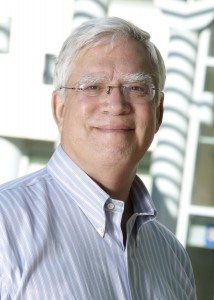The Social E-Textbook

E-textbooks. Hybrid and online courses. Using learner analytics to assess experiments that involve academic technology. The future of SmartSite.
These are a few of the areas that David Levin intends to discuss, and address, as director of Academic Technology Services for Information and Educational Technology. Below, you’ll find the conclusion of an interview with Levin. You can also read the full text.
The textbook, like any text in a sense, is a very individual and isolating thing. As I’m reading a chemistry text, I need to learn the important points. There are all kinds of clues. I have to figure out what is worth that yellow highlighter, and what annotations are valuable.
With an e-text, especially a network-based e-text, you can make it a social environment, so that I can ask people in my class what the problems are. It can be designed so the instructor can look in and see, if the students are willing, what problems the students are having.
It could take on the qualities of a wiki.
A wiki, a discussion board, all kinds of different things. It can take on ‘phone-a-friend’—you could have a tool so that a student who is having problems with a particular portion can ask the instructor or a TA. They can send a question to anyone in the class, anyone in the university, anyone reading the book. If the textbook is being used enough, chances are other people are reading this very passage at this very time. Can I send out a message to all of them, saying, ‘I didn’t get this’?
That not only helps the person who is asking the question—the other student in New York who is reading that, and believes they understand it well, will understand it even better if they explain it to somebody else.
Is this discussion about e-texts one you want to have on campus?
Oh yeah. It’s tied in to so many of the areas we’ve been talking about. I think where we want to go with e-text is critical. We’ve got to learn how to do it, and there are significant challenges in our thinking about how to do it.
I imagine you welcome faculty who want to talk with you about all this?
Absolutely.
What’s the best way for them to contact you?
Send me an email (dslevin@ucdavis.edu) or call me (530-752-2133). Even better, as much as I live in the virtual world, I want to get together and talk with you. So, set up an appointment. Drop by.
